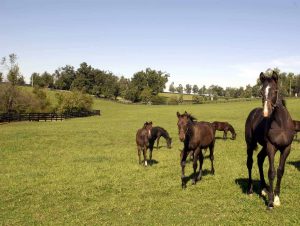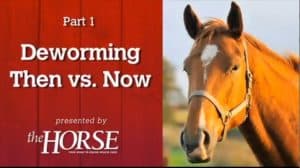
Understanding and Controlling Equine Internal Parasites
Learn important facts about equine internal parasites and their control in this special report!

Learn important facts about equine internal parasites and their control in this special report!

Dr. Martin Nielsen gives a basic overview of health issues that could indicate your horse has “worms.”

Foals are at the greatest risk for internal parasites. Dr. Kenton Morgan offers advice for protecting them.

The crowdfunding project, “Let the germs get the worms: Testing a novel probiotic compound for treatment of equine parasites,” began in January and has raised more than $8,000 so far.

Dr. Wendy Vaala shares important information about proper internal parasite control and deworming for suckling and weanling foals. She especially emphasizes the importance of treating roundworm infection.

Dr. Steve Sundholm of Equus Veterinary Service in Oregon City, Ore., talks about changes in internal parasite control protocols for horses over the years and introduces strategic deworming.
Sponsored by Fort Dodge Animal Health

New recommendations for worm control in horses are based on treating some horses more and others less. A “selective” deworming program will result in fewer treatments given (leading to less drug resistance), but if used properly will still result in better overall parasite control.

The horse’s environment is a critical elements to consider when constructing an effective anti-parasite strategy. The key to exploiting environmental events is understanding when and how Mother Nature works in our perpetual battle against worms.
Editor’s Note: This is part eleven of a 12-part series on internal parasites of horses.
BY KAREN BRIGGS, WITH CRAIG REINEMEYER, DVM, PHD; DENNIS FRENCH, DVM, MS, DIPL. ABVP; AND RAY KAPLAN, DVM, PHD
Editor’s Note: This is part 3 in a 12-part series on internal parasites of horses.
In the world of internal parasites, ascarids get no respect. Unlike strongyles, they aren’t a high-drama threat to your horse’s health, and they
Stay on top of the most recent Horse Health news with
© 2022 Copyright Statement dolor sit amet, consetetur sadipscing User Terms, sed diam nonumy eirmod tempor invidunt ut labore et dolore magna aliquyam erat, sed diam voluptua. At vero eos et accusam et justo duo dolores et ea rebum. Stet clita kasd gubergren, no sea takimata sanctus est Lorem ipsum dolor sit amet.
"*" indicates required fields